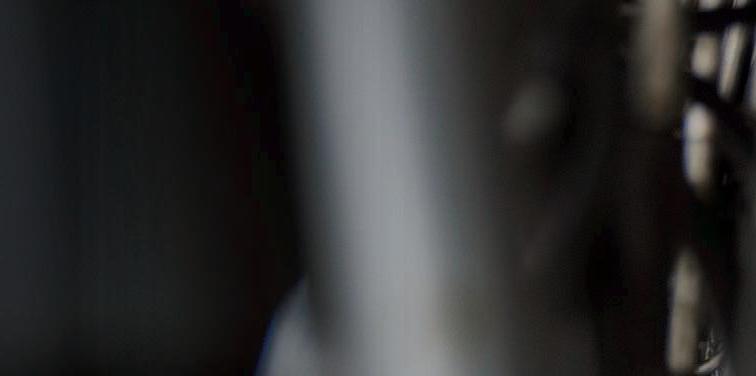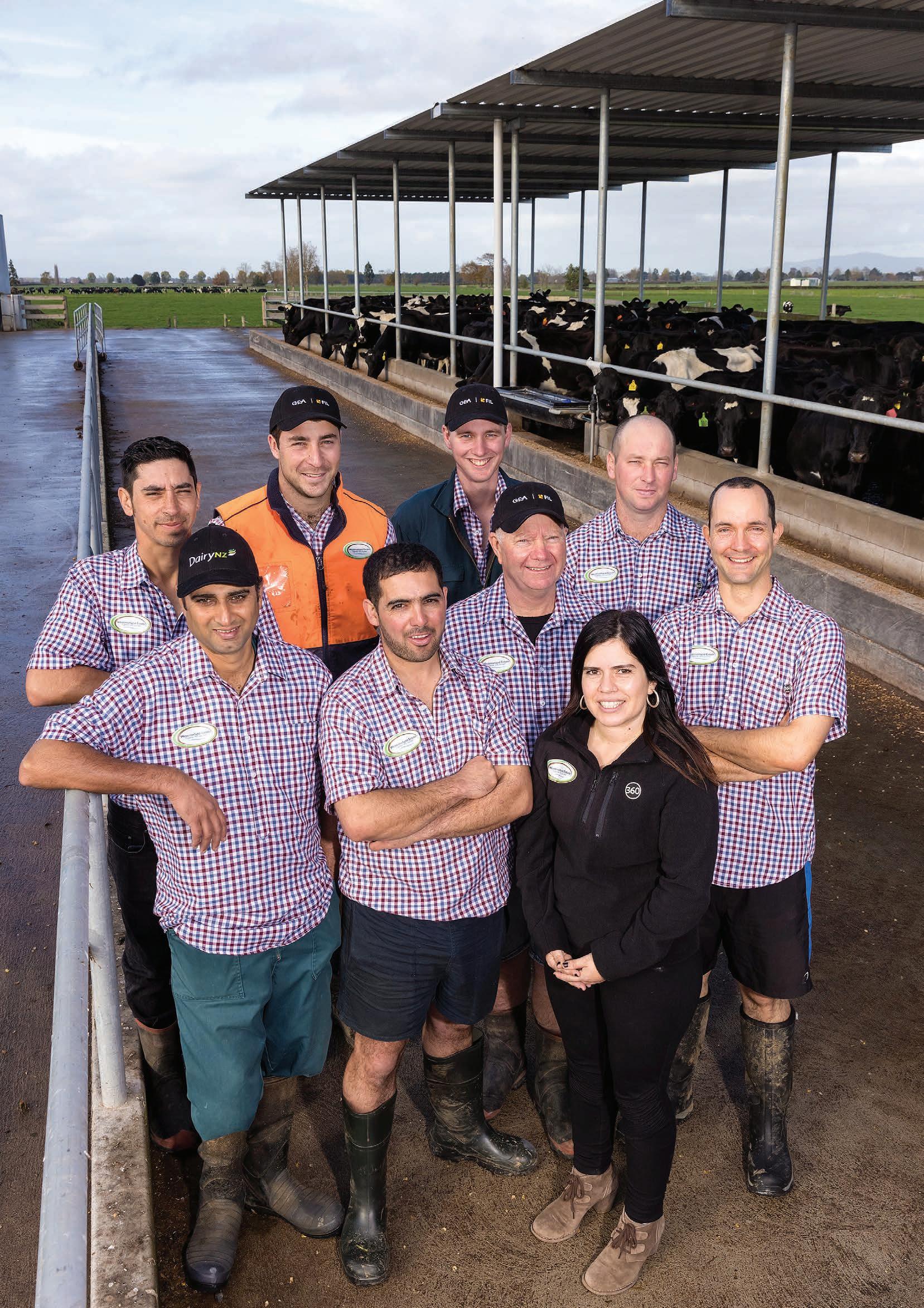
16 minute read
A good combination
by AgriHQ
Staff are the heart of a Waikato farm
A Waikato farming couple have adopted a people-first culture in their farming business, rather than focusing on how much milk they can produce.
The measure of a dairy farm’s success isn’t in the litres of milk in the vat or the number of cows in the paddock.
It’s about maintaining the wellbeing of the people who work there because when they thrive, everyone succeeds.
It’s a philosophy David and Sue Fish have adopted in every facet of their farming business on the three farms they own near Waitoa in Waikato, where they milk 1300 cows on 340ha.
The “Westmorland Estate way” – as they call it – is recognition that the 12 fulltime team members they employ are the heart and soul of their farming business.
“We could do nothing without them,” Sue says.
At the heart of their ideals is the simple notion of respecting and valuing other people.
David and Sue quickly realised they needed other people if they were ever going to reach their farming goals. As their business grew over the years, Sue says those people deserved the same level of respect they gave each other.
That growth from 2014-2020 saw them purchase farms, improve them, either selling them for a higher value, or keeping and amalgamating them into the existing business.
David says they grew because the opportunity presented itself and he enjoyed taking and improving those blocks so they were in a better state when they were sold.
After a while they sought out the services of close friend, Coach Approach’s Matthew Pickering to help them hone their ideas and offer some other perspectives, tools and processes, to help take their team to the next level.
Each staff member had a one-on-one session with Pickering to identify their goals and values.
The whole team then did an activity to learn more about each other called Tetramap.
“The power of that is that it is fundamental to understanding how each individual person likes to be communicated with in any given situation. In our case, how that person will work in a team environment and which type of person he/she will work best with,” she says.
“You may not have the skill, but you have the attitude we are looking for, that is important to us. As we have got good training programmes in place to support our team.”
That process begins with background, goals and personality tests, followed by an interview with Sue, David and their business production manager Dries Verrycken.
“Personality and attitude rather than experience are key indicators when recruiting new staff. These two traits also allow us to calculate whether a new employee is a good fit for the rest of the team or not,” Dries says.
Sue says a new employee may come to the farm with no farming skills at all.
“We have had people – especially from overseas – who didn’t know what a cow was when they started working with us and then in a short space of time, they’re operating a cowshed with 300-400 cows on their own,” she says.
Dries handles all the training when a new employee starts working. This ranges from health and safety, farm rules, biosecurity, farm procedures, animal welfare, farm hazards and machinery maintenance.
Dries says keeping our people safe is a priority.
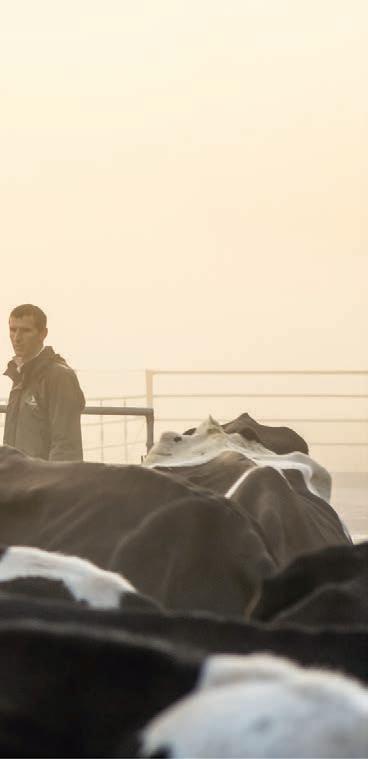
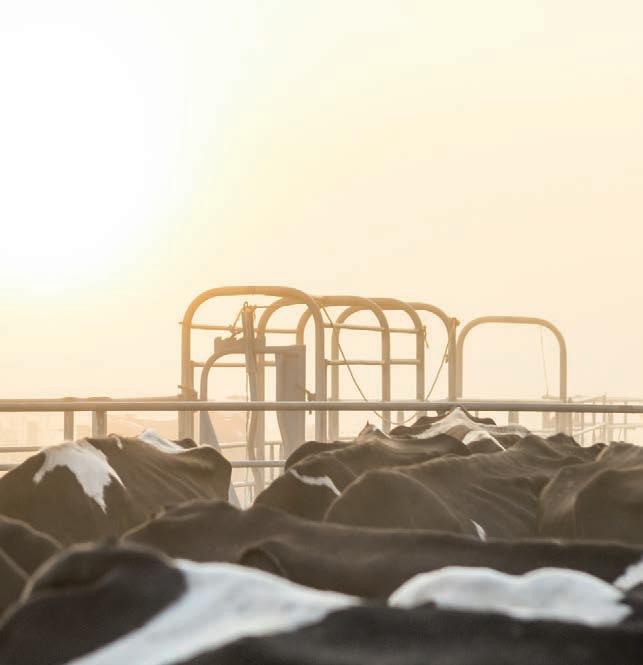
FARM FACTS
• Owners: David and Sue Fish,
Westmorland Estate Ltd Farms • Location: Waitoa, Waikato • Farm size: 340ha • Herd size: 1300 cows across three farms • Team members: 12 full-time and one part-time
Continued page 10
Bank of backing agribusiness
Creating sustainability for the long haul
Managing your agribusiness’ financial and environmental sustainability can be tough. So it’s good to know there’s a bank that can help. Not just with practical support and information, but with capital solutions too. Speak to one of our local agribusiness specialists today. Visit bnz.co.nz/agribusiness
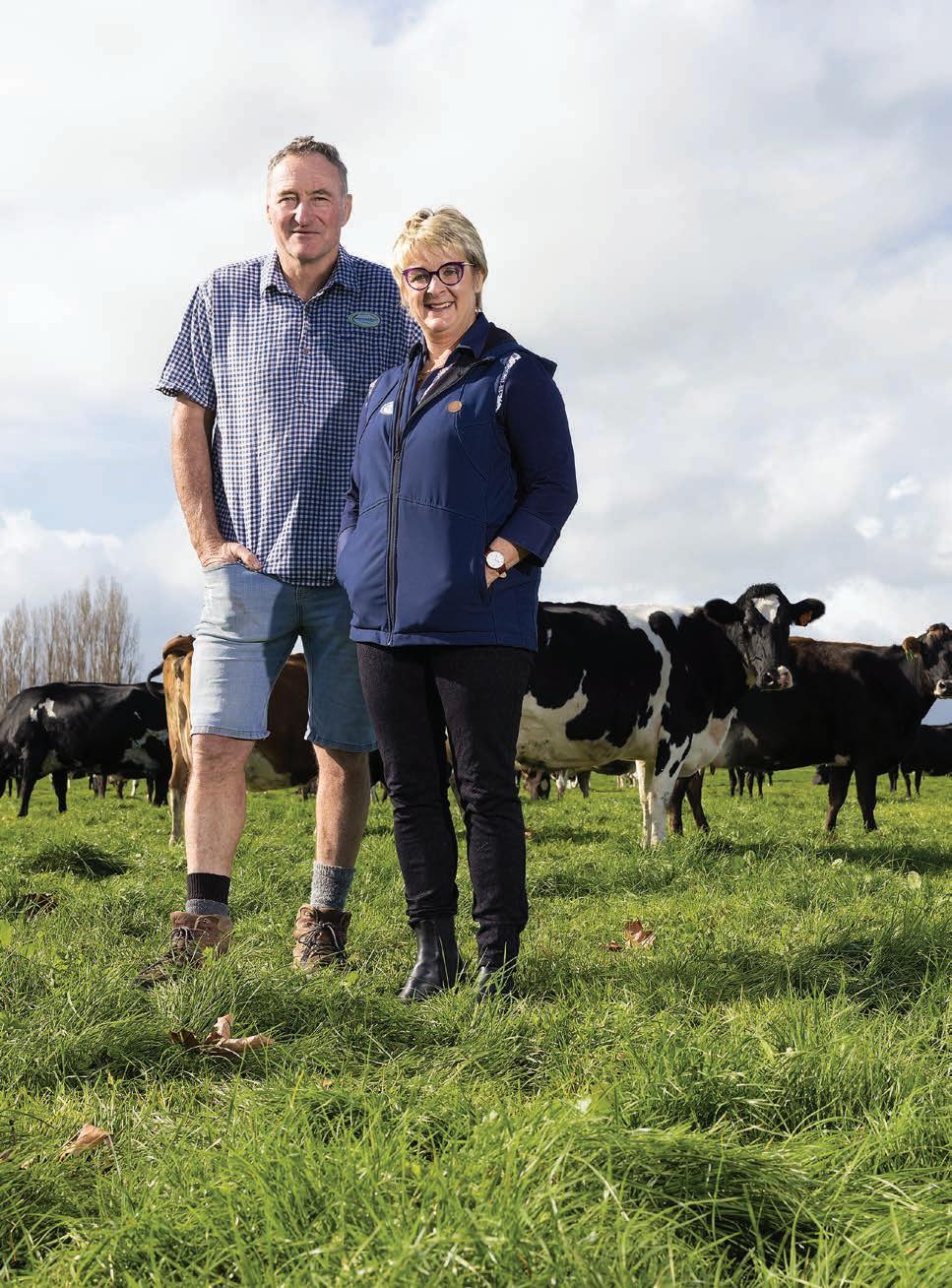
David and Sue Fish own three farming businesses near Waitoa in Waikato, where they milk 1300 cows on 340ha, which they run with a strong team of 12. “This covers every aspect of what Westmorland Estate means as a business and why it has been successful, grown and is profitable – it’s because of the people.”
Sue Fish
“For us it is very important that every team member is able to do every job on the farm and they get trained for it,’’ he says.
They also encourage staff to undertake tertiary courses from providers such as Ag ITO, online universities, workshops and seminars.
Currently, Dries and another team member are both in the middle of completing business diplomas. Other team members are busy with diplomas in psychology, ITO level 4, or finished ITO level 5, while some of them are going to start ITO level 3.
Four of their team members also attended the recent DairyNZ Farmers Forum in Hamilton.
“Each and every member of the team has come with some form of skill and we try to recognise that,” he says. “We have teachers, builders, payroll, masters in economics, agronomist, animal science, engineering in agriculture, computer graphics – powerful skills onboard that can enhance any business.”
www.aztechbuildings.co.nz
THE UNDISPUTED LEADERS IN ANIMAL HOUSING AND FEEDPAD COVERS, NEW ZEALAND WIDE.
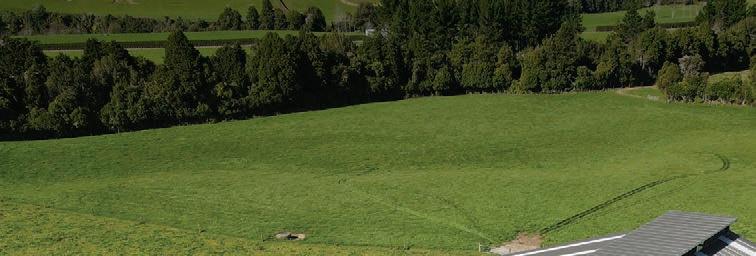


Want to see it for yourself? Talk to the Aztech team and we will arrange for you to visit working farms where our structures have dramatically improved profits, animal comfort and effluent disposal.
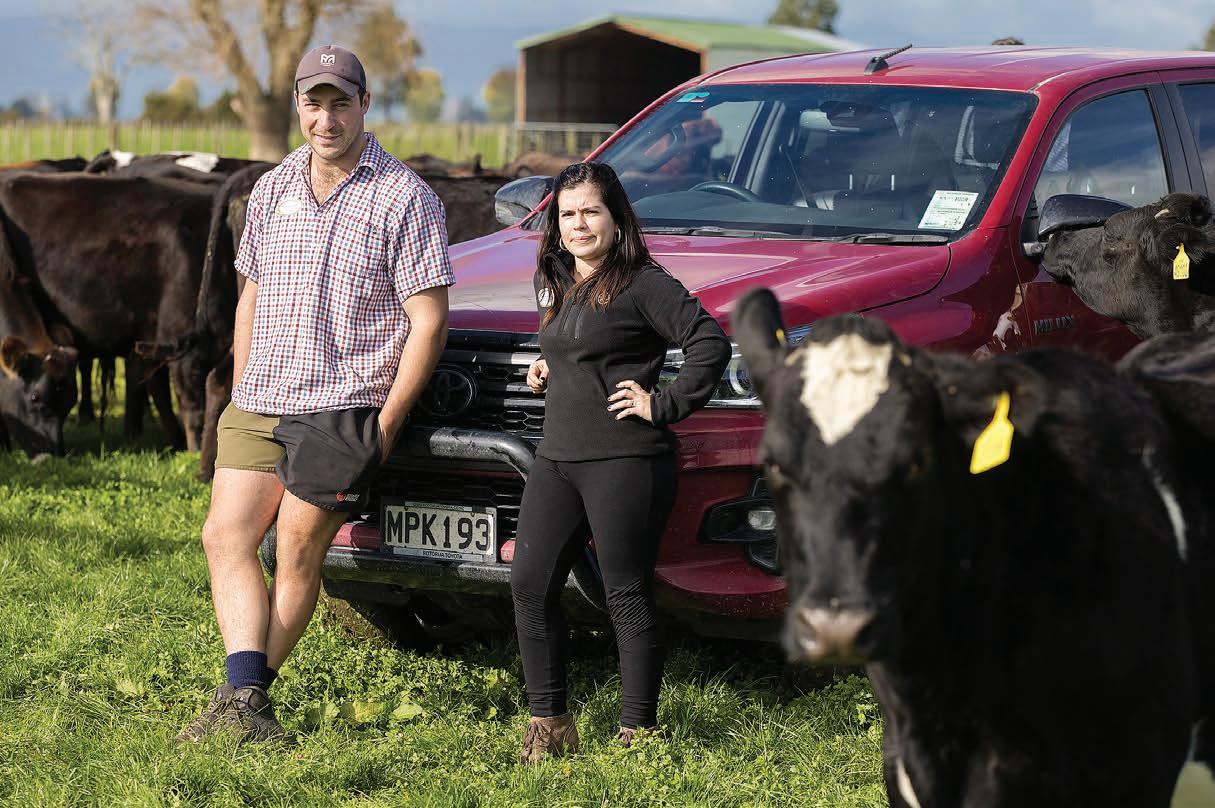
Originally from Belgium, Dries Verrycken came to New Zealand on a working visa in 2011 and Paola Verrycken who comes from South America, arrived in 2010 to study agriculture. The husband and wife team now have three children and work side-by-side at Westmorland Estate.
Sue credits Paola Verrycken, who oversees their HR, health and safety, administration and payroll, for being able to bring people together and finding out those skills among her team and enabling them to be demonstrated in the business.
“And that can be as simple as having IT skills, openly encouraging them to use it,” she says.
Sue and Paola’s aim is to keep the team motivated, well looked after, ensuring everyone has work-life balance.
They also ensure that health and safety regulations, employment law, immigrations law, biosecurity and environment matters are met. Both organised team events, team rewards, roster time off, workshops, seminars and check for new technologies in the market.
To keep up team engagement during last year’s covid-19 lockdown, Paola and Sue held an interstaff photo competition and got the staff to create videos on what gave them happiness.
All were posted on the farm’s website, created by Paola and their son Aubrey and on social media.
“They were great and we discovered we have a lot of musicians among us,” she says.
“It comes back to people and culture. This is all Westmorland Estate and none of this is from the outside. The culture that we have got is a combination of
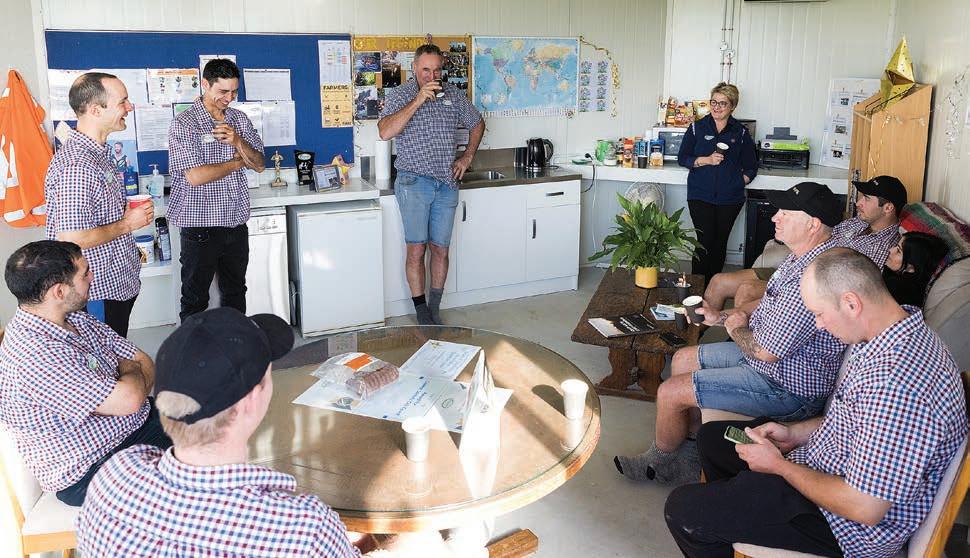
The multicultural team, coming from Ukraine, Nepal, UK, Philippines, Belgium, Uruguay, New Zealand, Chile and Argentina, regularly get together to discuss farm jobs and goals. everybody coming together and once you have got that, it’s protected to the nth degree.”
They use a variety of sources to find staff, including word of mouth and job websites, schools and Facebook.
More recently, people are approaching them looking for work because of Westmorland Estates reputation as a good employer.
“That shows that it’s working,” she says.
Westmorland Estate has the recognition from Immigration New Zealand as an accredited employer. This recognises good procedures and practices in place.
Paola also convinced Sue and David to use social media to further promote their business.
Half of their staff are from outside NZ and this helped those staff maintain their connections with people in their home countries.
On a day-to-day basis across their three farms – Westmorland, Sandhurst and Somerset – the staff are organised by Dries with a daily roster of three days of work ahead.
This ensures everyone knows what to do, everyone is home on time and that performance and efficiency of the farms are met.
Westmorland Estate operates on a 6-2 roster to ensure their people get a good rest.
Their main goal with daily jobs on the roster is to ensure no staff member works

Paola Verrycken and Dries Verrycken get out amongst the herd.
more than 45 hours a week, Dries says.
Sue is prepared to shorten that roster if staff start getting tired, which she did during last season’s calving.
This had no effect on their pay or leave entitlements.
Staff are also strongly encouraged to take hour-long breaks over breakfast and lunch and this, along with their work hours, are monitored using an app.
“It’s really important that they take that rest time and eat well,” she said.
Sue, Paola, Dries and David also sit down once a week and work out what the events will be for the week ahead and to keep up with new legislation, employment law, immigration, health and safety, team wellbeing, workshops, seminar, events, roster time off the month ahead and process any annual leave requests.
“Everyone knows well in advance when they’re working and when they are not,” she says.
Milk production is not a key indicator of success for the Fish business.
The focus on production is something ingrained in the industry they believe must change because of the perceptions it creates around the success or failures of a farm business.
While they have individual production targets for each farm, David says it is not the Westmoreland Estate way to make these numbers public and undermines what they are trying to achieve around their business culture.
Sue adds that the greatest thing Westmorland Estate has done differently is its people and its culture, and everyone working towards a common goal to produce quality milk, by nurturing people, livestock and land.
“This covers every aspect of what Westmorland Estate means as a business and why it has been successful, grown and is profitable – it’s because of the people,” she says.
Too many farmers are pushing their business to meet production targets at the expense of themselves or their team’s wellbeing.
“David and I might set the (production) targets, but it’s our team that strives for them and the only reason that they strive for them is because they’re engaged,” she says.
“We couldn’t have done it all without our team.” All three farms are spring calving; two supply Tatua and the third, Fonterra.
The farms all run on a System 4, where feedpads are utilised daily. The herds also spend the majority of their time on pasture. Maize to supply the feedpads is grown on 55ha of support blocks and palm kernel is brought in.
While the farms are run as separate units by Dries and his team – Prakash Pokhrel, Ievgenii Dushkevych, David Cleary, Aubrey Fish, Federico Lopez, James Collins, Steven Matthews, Ken Ragasajo, Declan Tully and Barbara Hinton – there is integration between the
Sue Fish

Owner David Fish and some of the team catch up before heading out for the day.
three farms when it comes to major jobs such as drying off.
“We’re always there to give each other a hand. The team aspect is very important. “Dries says.
The team do weekly farm walks to check on pasture covers and upload and update the information in Google Drive.
This is used to create a feed wedge and make decisions around pasture management and how much supplement is fed out. On average, the cows are fed around 17-18kg a day of dry matter.
“Based on pre-grazing average pasture cover and growth, supplements are then adjusted into it,” he says.
The cows are dried off according to their body condition and over winter, around 10% of the cows are sent off-farm to a support block, while the rest remain on their respective farms.
Starting spring, the three respective herds are split into two and run as younger and older mobs.
Calving starts on July 1 and runs through until September. The heifer calves are kept on the farm and get a first feed of colostrum before being housed in their rearing facility.
The calves are fed once a day in the afternoon on a probiotic formula to boost their growth and immunity, as well as being provided hay and meal on an ad lib basis.
The calves are then weaned onto chicory and supplements until they are old enough to be sent to their grazier as yearlings.
“Feeding them once a day has been a success; calves are heavier than before when we used to feed them twice a day. It also frees up the team for other jobs and puts less stress on them,” he says.
The work culture David and Sue have created is something they refuse to compromise on.
They treat it as a living entity rather than a document that sits in a plastic folder on the desk.
On a whiteboard in their office/ breakroom is a horizontal line drawn
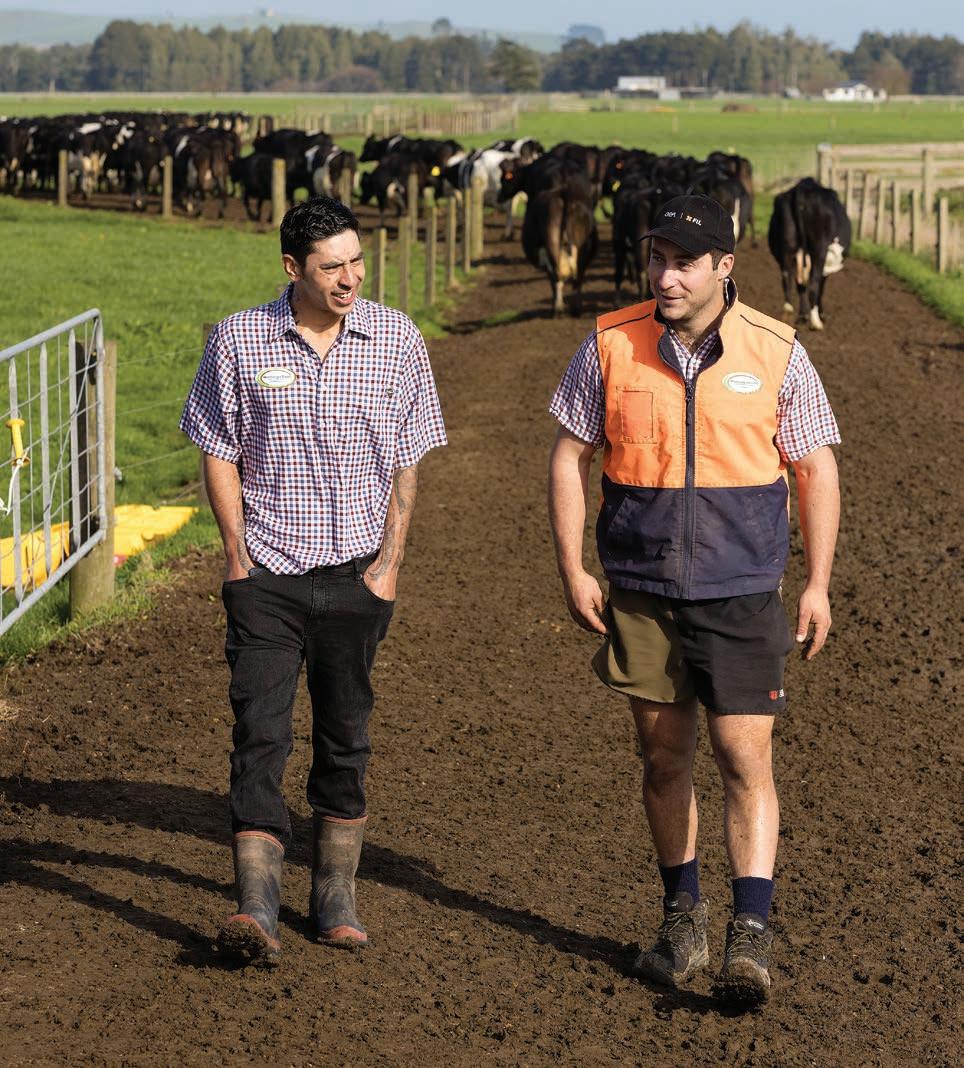
Continued page 14
Farm manager Steven Mathews and Aubrey Fish head back to the cowshed after letting the herd go.
with a marker. Above and below this line are over a dozen words and phrases written which signify good behaviour or poor behaviour, which the whole team decided together.
“Using a catchphrase to suggest below-the-line behaviour allows the recipient to reflect on their conduct, without having the conflict,” she says.
Respect, honesty and integrity derives from having this kind of tool in place.
It ensures the team’s own cultures and values are known and respected by everyone. This is critical because so many of the team members are not native to NZ.
They have a multicultural team, coming from Ukraine, Nepal, the UK, Philippines, Belgium, Uruguay, NZ, Chile and Argentina.
“They are all working for Westmorland Estate and they are all working for a common goal, which is our mission to produce quality milk by nurturing people, livestock and land. Yet we come from all over the world, with different values and cultures,” she says.
Their logo – Together WE Succeed – encapsulated the team aspect ahead of individuals within the business.
Dries says when one team member makes a mistake not only are they spoken to, but they also look to see if there was anything they could have done as a team to prevent that mistake from happening in the first place. This team accountability was great, he says.
“There’s no blame game here and if something like that happens, we have all failed and it’s really powerful,” Sue adds.
The approach has been welcomed by their team. Longserving team member David Cleary says those who do not stay long usually leave because they don’t fit into the company culture.
David says this team-first policy was the reason it had such little turnover among the ones who stayed.
“Personally, I think it’s because the team comes first. The better we are, then the better we operate and the better we are as a team. They have always been like that, but now it’s just systematic and everyone’s bought into the idea,” David says.
Declan Tully welcomed the inclusiveness between the business and their team.
“They listen to you. There’s no divide between the people at the top and the people down below,” Declan says.
“When you have problems, the business supports you and your family, and that makes you very grateful. I will do my best for Westmorland Estate,” Prakash Pokhrel adds.
“Personality and attitude rather than experience are key indicators when recruiting new staff.” Dries Verrycken
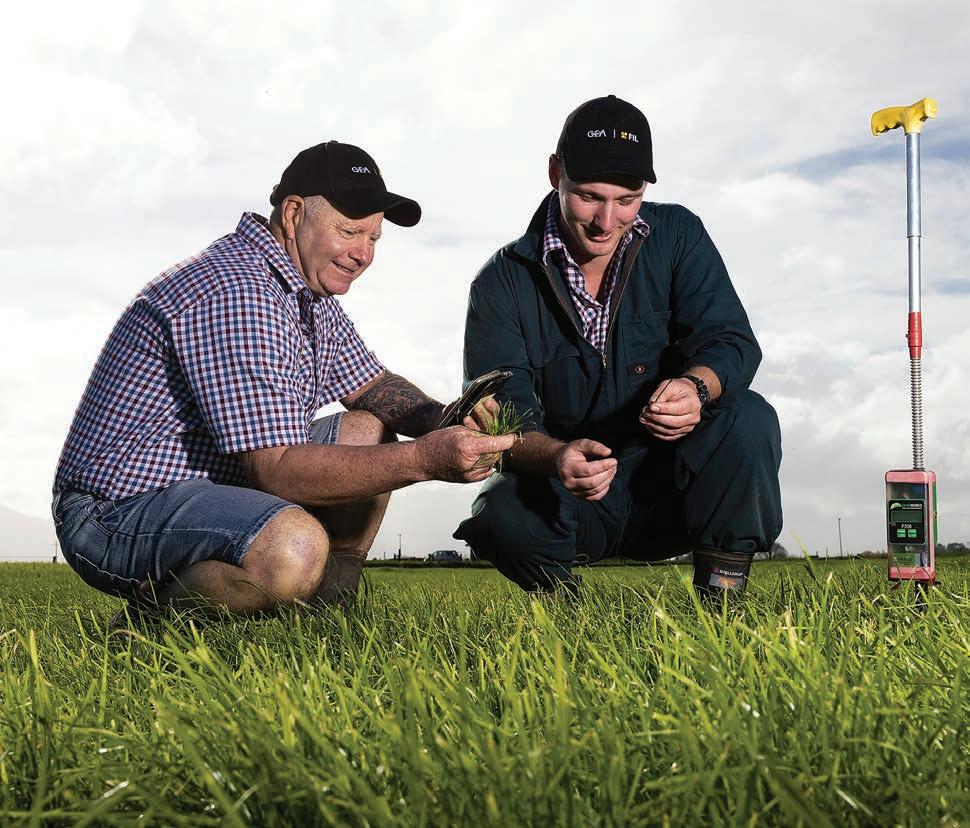
Farm assistant Declan Tully and David Cleary get out with the pasture meter to monitor feed levels.
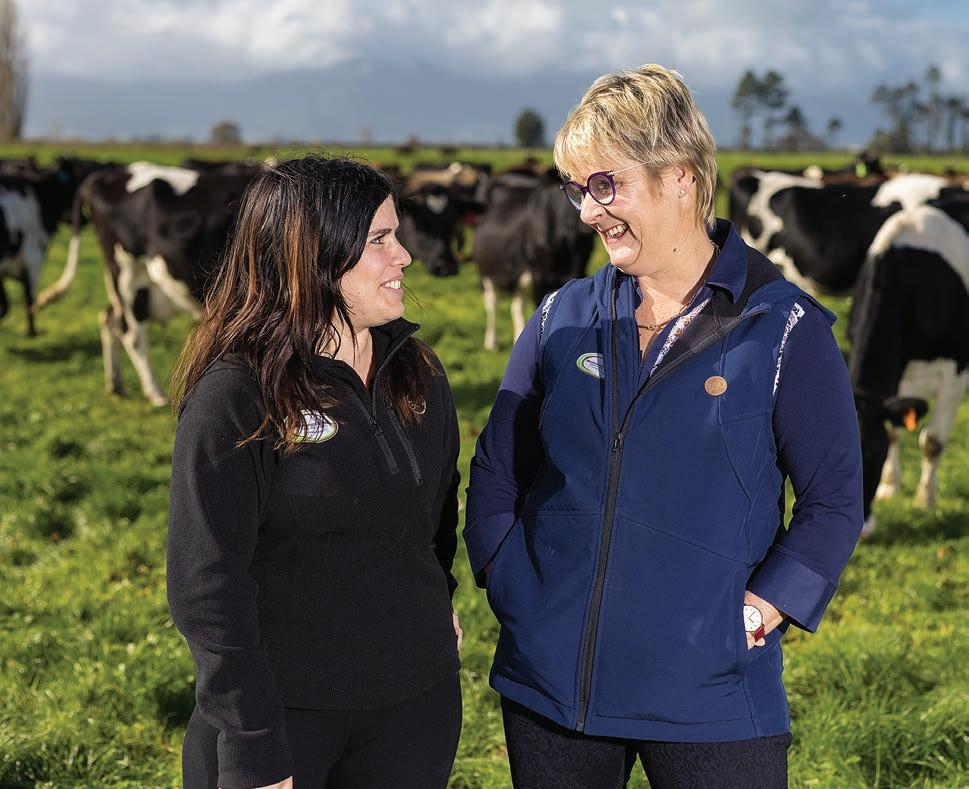
Sue Fish and Paola Verrycken, who oversee their HR, health and safety, administration and payroll, aim to keep the team motivated, well looked after and ensure they all have a good work-life balance.
The team also has in-house awards, including an employee of the month, which all teams vote for. The prize for that award is an off-farm activity during work hours.
“It’s a peer review from within the team and little things like that make a huge difference,” Dries says.
Sue and David also credit local businesses as having a major influence on their success and are a part of their annual in-house team awards. These include Farm Pride, Values, Best Calves, Empty Rates and Somatic cell count.
The awards are contested between the three farms and further drive their performance.
The SCC on all three farms, for example, is now below 100,000, with the lowest for last season on reading was 31,000.
The Fish’s do not understand why systems like theirs are not more widely adapted in the dairy industry, particularly in the current climate where so many are experiencing staffing shortages.
While there is always a level of turnover as people progress through the industry to more senior positions, more farm owners need to ask themselves why the turnover rate was so high.
Sue says changing this trend can only start with the farm owners.
“It starts from the top and changing their mindset to understand that people are the heart of your business,” she says.

Farm manager Federico Lopez and business production manager Dries Verrycken chat about which paddock the herd is going in.
Sometimes
IT TAKES A SECOND LOOK TO KEEP THINGS TICKING


MILK QUALITY 2021

New Zealand needs its dairy farmers to keep great quality milk flowing. When you win, we all win. To get you ready for success this season, we’re here to help get your shed hygiene sorted. Reduce the chance of elevated SCC levels and improve hygiene performance with trusted, tailored advice on rubberwear, teat sprays, and more. We have all the info and products you need to help you clean up this season.
NZFARMSOURCE.CO.NZ/MILKQUALITY | 0800 731 266
